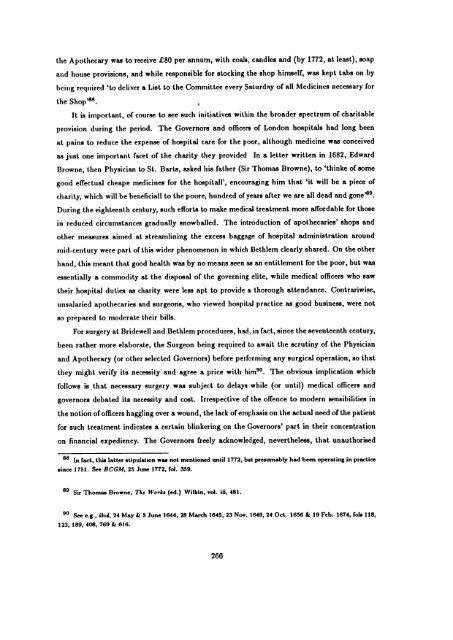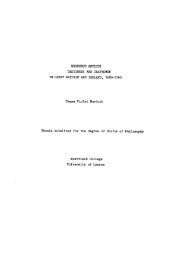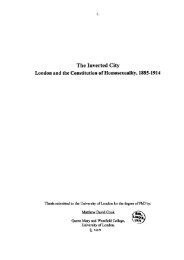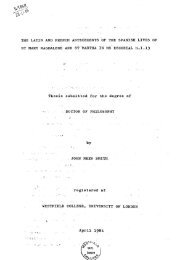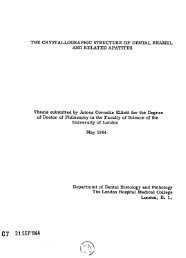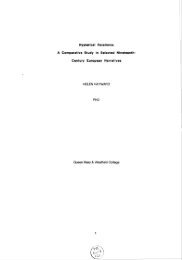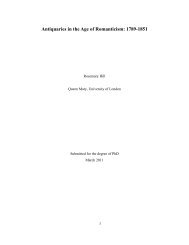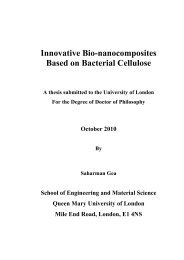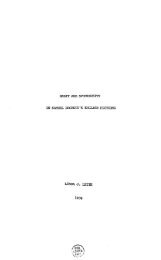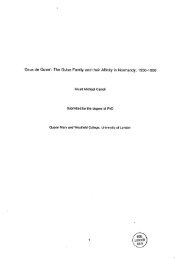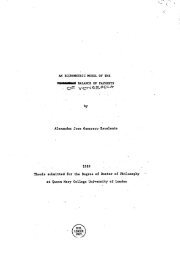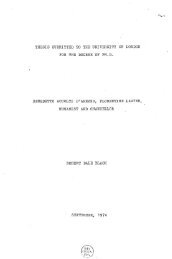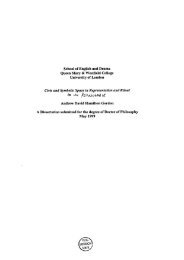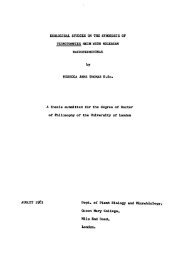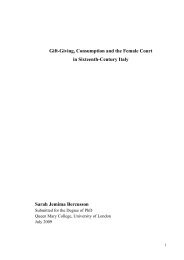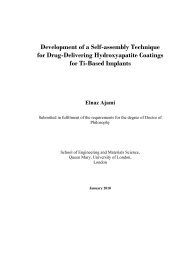- Page 1 and 2:
Queen Mary and Westfield College Lo
- Page 3 and 4:
Abbreviations Contents Chapter 1 In
- Page 5 and 6:
Acknowledgments The list of those I
- Page 7 and 8:
Chapter 1 Introduction: The Histori
- Page 9 and 10:
to 'be interesting' rather than ana
- Page 11 and 12:
paradigm of insanity' 9, and in ord
- Page 13 and 14:
that the development and practice o
- Page 15 and 16:
cure remained a vital object of the
- Page 17 and 18:
Introduction Chapter 2 Visiting In
- Page 19 and 20:
accessibility' ?12 It is not enough
- Page 21 and 22:
would tend to verify the statements
- Page 23 and 24:
ernors concerning the conduct of st
- Page 25 and 26:
The Exhortatory Show And The Visito
- Page 27 and 28:
een worn by the apprentices of Brid
- Page 29 and 30:
more likely a patient was to receiv
- Page 31 and 32:
e compared to Isabella's role in Th
- Page 33 and 34:
egard the patients of Bethiem as th
- Page 35 and 36:
theorists and moralists were accord
- Page 37 and 38:
Lockean psychology on the Age of Re
- Page 39 and 40:
of madness onto society more often
- Page 41 and 42:
applied to visiting Bethiem. Thus,
- Page 43 and 44:
always mischievous; and that 'if ev
- Page 45 and 46:
a similar fashion, in The Changelin
- Page 47 and 48:
Although the 8taff knew 'nothing ab
- Page 49 and 50:
and the corners of her mouth raised
- Page 51 and 52:
and to obtain most 'cause for laugh
- Page 53 and 54:
periods, the 'Sport' often became r
- Page 55 and 56:
For Anne Digby, too, public visitin
- Page 57 and 58:
England and France went to consider
- Page 59 and 60:
alias Joseph Warton, in The Adventu
- Page 61 and 62:
a year of its opening, he 'was so c
- Page 63 and 64:
so contrary an effect' on him that
- Page 65 and 66:
sympathy for 'those under such Dism
- Page 67 and 68:
or woman 'of feeling'. From searchi
- Page 69 and 70:
It was no mere coincidence that Tho
- Page 71 and 72:
themselves', three years before thi
- Page 73 and 74:
without the Direction of Reason and
- Page 75 and 76:
expostutated, after outlining the s
- Page 77 and 78:
e sad', indicates how little had ch
- Page 79 and 80:
may well have been confined by in l
- Page 81 and 82:
Tryon that visitors were allowed an
- Page 83 and 84:
Tryon had alleged that I3ethlern wa
- Page 85 and 86:
cells, and only 'afforded' the usua
- Page 87 and 88:
Moorfields can have done little to
- Page 89 and 90:
to the amelioration of such conditi
- Page 91 and 92:
Sundays when visitors were barred 3
- Page 93 and 94:
acco began to come into better favo
- Page 95 and 96:
crusading endeavours to tighten lic
- Page 97 and 98:
to have secreted nearly £12 in her
- Page 99 and 100:
in four public newspapers and poste
- Page 101 and 102:
adjustments had to be made to the b
- Page 103 and 104:
carceral institutions447. If such d
- Page 105 and 106:
Like Swift, Mackenzie, in his The M
- Page 107 and 108:
Governors what a provocation naked
- Page 109 and 110:
observed a male patient leap on the
- Page 111 and 112:
to mental and physical health, and
- Page 113 and 114:
infirmaries, unless friends or rela
- Page 115 and 116:
The only question Carkesse records
- Page 117 and 118:
pots 'in the Spectators' Faces'522.
- Page 119 and 120:
y visiting 'the hospitals about thi
- Page 121 and 122:
Court dealt with both complaints in
- Page 123 and 124:
in excess of expenditure. By 1770,
- Page 125 and 126:
Hyde in 1781, and Jane Gibbs in 180
- Page 127 and 128:
whose immediate care they were573 D
- Page 129 and 130:
N N Uj I- LA 0 0 (n . 0 I U C CL I
- Page 132:
Fig. 2d Stone rigur.s o? '1s1ancho1
- Page 135 and 136:
Fig. 2g New Beth1en in Moorfields c
- Page 137 and 138:
- -,.----1 T 1fi' a - -4Ti L- I F1
- Page 139 and 140:
Pig. 2k View of Betbiern at Moorfie
- Page 141 and 142:
The fact of the matter is that hist
- Page 143 and 144:
emoved the artificial obstacles sta
- Page 145 and 146:
edding permitted' at I3ethlem is il
- Page 147 and 148:
semi-naked state. James Carkesse co
- Page 149 and 150:
when provided with them36. Benefact
- Page 151 and 152:
charged if their securities failed
- Page 153 and 154:
essaries were still 'wanting for th
- Page 155 and 156:
equired 'Sheeted Beds'. While 22% i
- Page 157 and 158:
deemed capable of looking after the
- Page 159 and 160:
subject of considerable censure in
- Page 161 and 162:
Indeed, there is very little direct
- Page 163 and 164:
vaults at most 100 . Generally in t
- Page 165 and 166:
or lousy 'Kennels' was viewed by ma
- Page 167 and 168:
concern for matters of hygiene and
- Page 169 and 170:
hospitals and prisons'. Moreover, t
- Page 171 and 172:
one means of subjugating the signs
- Page 173 and 174:
have supposed. Awareness of the nee
- Page 175 and 176:
and that the Committee regularly we
- Page 177 and 178:
lunacy, as a means of enclosing the
- Page 179 and 180:
of the darkness of Bethiem had as m
- Page 181 and 182:
the sober splendour of the hospital
- Page 183 and 184:
It would be erroneous to suggest, h
- Page 185 and 186:
the weather in contemporary medical
- Page 187 and 188:
Diet: feeding and starving the poor
- Page 189 and 190:
to Bethiem until 1708, by which tim
- Page 191 and 192:
to mechanistic theories of diseased
- Page 193 and 194:
in, the eighteenth century hospital
- Page 195 and 196:
D inner: Supper: Dinner: Supper: DI
- Page 197 and 198:
which was an intermittent source of
- Page 199 and 200:
What was missing from the Governors
- Page 201 and 202:
aged the Matron and Cook to 'scum y
- Page 203 and 204:
'every indulgence, which oeconomy p
- Page 205 and 206:
Bethlem, in 1692, that the care of
- Page 207 and 208:
seems at least to have acted as a s
- Page 209 and 210:
occupying patients after mid-centur
- Page 211 and 212:
of which Bethiem has been the great
- Page 213 and 214:
most other witnesses at the 1815/16
- Page 215 and 216:
Bethlem338 In the period before the
- Page 217 and 218:
number of Lunatikes' and of 'their
- Page 219 and 220:
with appropriate medicaments, and d
- Page 221 and 222: Chains were imposed as a matter of
- Page 223 and 224: against his physical or moral emanc
- Page 225 and 226: a patient was restrained and of the
- Page 227 and 228: ential, when viewed in the context
- Page 229 and 230: unhealthy obstructions, and even at
- Page 231 and 232: p[re]dudiciall to the said hospital
- Page 233 and 234: cells throughout the period, and th
- Page 235 and 236: apeutic/classificatory division of
- Page 237 and 238: the Governors claimed (with an iron
- Page 239 and 240: (agreeing to abate the entire sum o
- Page 241 and 242: access (with the complicity of staf
- Page 243 and 244: of Bridewell and Bethlem 'proposed'
- Page 245 and 246: Fig. 3a City Surveyor, George Dance
- Page 247 and 248: Pig. 3c g160 I, G -t ? Detail from
- Page 249 and 250: Robinson and Robert Whytt, amongst
- Page 251 and 252: Appointments, patronage, sa1arie an
- Page 253 and 254: and accounting of patients' fees an
- Page 255 and 256: independent right to govern the hos
- Page 257 and 258: At the beginning of the eighteenth
- Page 259 and 260: London for seven years when appoint
- Page 261 and 262: sity, and had accompanied his fathe
- Page 263 and 264: een well groomed for the Bethlem po
- Page 265 and 266: despite his preparedness to serve w
- Page 267 and 268: not succeed his master directly to
- Page 269 and 270: attendance from that of other physi
- Page 271: the hospitals by checking the Apoth
- Page 275 and 276: predecessors to absenteeism. With t
- Page 277 and 278: however, and the assessment of The
- Page 279 and 280: with the Apothecary, the size of hi
- Page 281 and 282: apprentices and staff of Bridewell,
- Page 283 and 284: Nurse had a 'great practice in the
- Page 285 and 286: Bride, where he was resident, in su
- Page 287 and 288: estates to comfortably bring in an
- Page 289 and 290: his appointment'63. Therapy or negl
- Page 291 and 292: those admitted to the hospital, was
- Page 293 and 294: idiculed and censured by his enemie
- Page 295 and 296: give presentations upon numerous po
- Page 297 and 298: the conduct of numerous demonstrati
- Page 299 and 300: can hardly have been expected to ab
- Page 301 and 302: Indeed, hunter and Macalpine did so
- Page 303 and 304: (including the hire of 'a Midwife'
- Page 305 and 306: Lunacy', but also for her 'sore leg
- Page 307 and 308: he had performed, his quantifying o
- Page 309 and 310: physical injury to patients. One mu
- Page 311 and 312: sertion of Teresia Constantia Phill
- Page 313 and 314: part of the century, the Board cons
- Page 315 and 316: a great deal of cause for practitio
- Page 317 and 318: the patient', and claimed that, not
- Page 319 and 320: assessment that 'very little of rea
- Page 321 and 322: negative in the extreme. Rather tha
- Page 323 and 324:
The revolution represented by St. L
- Page 325 and 326:
introduction of the therapy of cold
- Page 327 and 328:
LO N- F—I _C)
- Page 329 and 330:
Table 4c: BETIILEM & BRIDEWELL APOT
- Page 331 and 332:
Introduction Chapter 5 The Rule of
- Page 333 and 334:
and most reviled of all, while 'Bed
- Page 335 and 336:
however, this ruling was to be inst
- Page 337 and 338:
of the office, than with the profli
- Page 339 and 340:
father's social standing; 'a grave
- Page 341 and 342:
Nicholson, Jewson and others, have
- Page 343 and 344:
and servants. During the seventeent
- Page 345 and 346:
Nixon had formerly been basketmen,
- Page 347 and 348:
mittee of governors, prompted by a
- Page 349 and 350:
than the rule at Bethlem. At St. Ba
- Page 351 and 352:
Male and female servants alike were
- Page 353 and 354:
active governor, while Joseph Arnol
- Page 355 and 356:
of interest on the Governors' part,
- Page 357 and 358:
discharge, without any sign of disa
- Page 359 and 360:
Bridewell'31. Inferior officers far
- Page 361 and 362:
instead of increasing staff salarie
- Page 363 and 364:
While Bethlem servants' wages remai
- Page 365 and 366:
almost expected that Stewards would
- Page 367 and 368:
With Bethlem's resiting and expansi
- Page 369 and 370:
servants to care for them; at 1:17.
- Page 371 and 372:
side the Porter, he was also suppos
- Page 373 and 374:
were paramount as never before. She
- Page 375 and 376:
Matron, three basketmen and a singl
- Page 377 and 378:
personall Attendance is required bo
- Page 379 and 380:
a result220. Indeed, there are indi
- Page 381 and 382:
Naturally, attendance was healthier
- Page 383 and 384:
careers. Basketmen were found guilt
- Page 385 and 386:
is unknown2as. Between 1700 and 177
- Page 387 and 388:
Thomas Willis, writing in 1672, cur
- Page 389 and 390:
punishment as counter-productive, b
- Page 391 and 392:
Katherine Goodfellow of 'abuses...d
- Page 393 and 394:
eminence as a place of cruelty towa
- Page 395 and 396:
abuse of patients by Bethlem staff
- Page 397 and 398:
instructed to 'locke her upp in one
- Page 399 and 400:
The period of Langley's Stewardship
- Page 401 and 402:
of supplementing staff's meagre wag
- Page 403 and 404:
forbidden repeatedly not 'upon any
- Page 405 and 406:
0Ø 0) WI;:!, w CO 0' 1 IC) EC1)
- Page 407 and 408:
- cr I- Cl) LO+ C,) 0 N- 0000000 (0
- Page 409 and 410:
0 co C C') 0 (0 (0 C C C (0 10 .o -
- Page 411 and 412:
Humphrey Withers Isaac Mount John H
- Page 413 and 414:
Table 5e: Bethlem Matrons (& Nurses
- Page 415 and 416:
Chapter 6 Patients, Obligors, and t
- Page 417 and 418:
als. The final section, on the subj
- Page 419 and 420:
weekly charge for patients, and the
- Page 421 and 422:
from 5/to 2/6 per week, a ceiling a
- Page 423 and 424:
insane, transferring or diverting m
- Page 425 and 426:
at the direction of Mr. Arnold, a g
- Page 427 and 428:
to Bethiem in 1654 at a weekly char
- Page 429 and 430:
compassion being eroded at the eigh
- Page 431 and 432:
Many obligors had, in fact, been mo
- Page 433 and 434:
(a friend of Tyson's and a writer o
- Page 435 and 436:
howse.. .[he] should have bene take
- Page 437 and 438:
in Figs 6d & 6e, which graph the se
- Page 439 and 440:
Prior to 1662, a year's residence h
- Page 441 and 442:
insane could be. The Bethlem Board
- Page 443 and 444:
acting on reports from persons unna
- Page 445 and 446:
abandonment of children described a
- Page 447 and 448:
handicapped105. It was the continue
- Page 449 and 450:
greater control over admissions aft
- Page 451 and 452:
ack home. When, for example, in 167
- Page 453 and 454:
Indeed, both Newell and Toote had b
- Page 455 and 456:
madhouses who complained bitterly o
- Page 457 and 458:
the appropriate action to be taken;
- Page 459 and 460:
other patients under severe threat
- Page 461 and 462:
to keep them at home or elsewhere w
- Page 463 and 464:
22 (or 22%) record that patients we
- Page 465 and 466:
desire for the cure of the afflicte
- Page 467 and 468:
the patient was provided for and 'r
- Page 469 and 470:
examine in any depth what the threa
- Page 471 and 472:
children & them Mischief'208. With
- Page 473 and 474:
numerous accusations of this nature
- Page 475 and 476:
one's own property was even less co
- Page 477 and 478:
ill of today attempt (or gain) acce
- Page 479 and 480:
1670-1762 after delivering letters,
- Page 481 and 482:
the scales of justice in the prison
- Page 483 and 484:
mirror on his accusers2 On the othe
- Page 485 and 486:
fined at Bethlem or elsewhere witho
- Page 487 and 488:
tunes earlier, such behaviour was l
- Page 489 and 490:
to look after them, but, if orphane
- Page 491 and 492:
members of the new Bethiem Committe
- Page 493 and 494:
and Bridewell. From the notorious b
- Page 495 and 496:
earthly, medical means. Moreover, w
- Page 497 and 498:
ate of female patients over male, f
- Page 499 and 500:
a similarly grim, if rather incompl
- Page 501 and 502:
months before her admission to Beth
- Page 503 and 504:
a temporary or exigency measure, un
- Page 505 and 506:
at Bethnal Green madhouse, and one
- Page 507 and 508:
hospital, over 22% of male admissio
- Page 509 and 510:
insensibility, to a prolonged, vege
- Page 511 and 512:
considered somewhat tautological. T
- Page 513 and 514:
did more for its public and paying
- Page 515 and 516:
0 '4— CI, C a) E I. a) (I) CI, C
- Page 517 and 518:
N.. 1 m '0 a' In (U U- U IA 0 U. Ii
- Page 519 and 520:
a' '0 (1) k4 '1 P'II 0 p 3' C X X C
- Page 521 and 522:
'ic) so 40 34 1' (0 icg 6g (,motIr)
- Page 523 and 524:
cc) 7ci 60 (0 - —2. Z-3 S-5 5-Jo
- Page 525 and 526:
w (0 E a) -D CC m 0 4-. '4- 0 C 0 -
- Page 527 and 528:
Table 6b: Occupations Iwhere record
- Page 529 and 530:
Table 6c: Patients' Occupations (wh
- Page 531 and 532:
Table 6d: Occupations (where record
- Page 533 and 534:
0 Q) Oi co ' ,- . I -- aci) (0 0, 0
- Page 535 and 536:
TABLE PE T ITI rs FOR A MISSION TO
- Page 537 and 538:
TOTALS 345 101-150km Place km Numbe
- Page 539 and 540:
ci) cci E ci) ccO ,T .r 'a) Ea Co 0
- Page 541 and 542:
C 0 Co Co E 0 CO CO cO -a-Cf) 1 0 C
- Page 543 and 544:
TABLEi(cQnt.l - DataOf Died' ______
- Page 545 and 546:
7b1e O csrRc FO& '!NCUMPLE' PATIENT
- Page 547 and 548:
TABLE PATIENTS' TOTAL JURATION OF S
- Page 549 and 550:
0 C,) 0 aa- 'I- 0 Cl) C) SI 0 F- 0
- Page 551 and 552:
4., '-4 El z 0p-I U) U) I-i ON
- Page 553 and 554:
\0 0 U) z 0 HU) U) H rL4r-4 0 U) U)
- Page 555 and 556:
ality of Bethlem's ancillary staff,
- Page 557 and 558:
function of extirpation, or was the
- Page 559 and 560:
• AppendiX 2a(ii) Grand Committee
- Page 561 and 562:
Appendix 2a(ii) continued t1 é i12
- Page 563 and 564:
H11RLRUIK METHODIST. To the Tune of
- Page 565 and 566:
:.L Appendix 3a(i) George Dance 'B
- Page 567 and 568:
Appendix 3b Prices & Composition of
- Page 569 and 570:
, Ii_ 6?Jd'4 L nLJ;:. — i %, t 3f
- Page 571 and 572:
KNOW all Men by ihefe Prefents, Tha
- Page 573 and 574:
It is necefarj the following Partic
- Page 575 and 576:
.!$ • 4,tJOy C4a14 — -- - T II
- Page 577 and 578:
7 Appendix 61 Certificate of settle
- Page 579 and 580:
Appendix 61(11 Letter from Sir Char
- Page 581 and 582:
ppendix 6m Petition for the admissi
- Page 583 and 584:
To the Right Worj7ipful the PR E S
- Page 585 and 586:
Appendix 6p Petition for the admiss
- Page 587 and 588:
6) Public Records Office:- PRO Kew
- Page 589 and 590:
John Gilbert, A Sermon Preached bef
- Page 591 and 592:
Thomas Arnold, Observations on the
- Page 593 and 594:
Thomas Dekker and John Webster, Wes
- Page 595 and 596:
the Real Art of Physick it self: an
- Page 597 and 598:
______ Things Plain and Weighty, Re
- Page 599 and 600:
James Yonge, The Journal of James Y
- Page 601 and 602:
Michael V. Deporte, Nightmares and
- Page 603 and 604:
W. L. Jones, Ministering to Minds D
- Page 605 and 606:
______ Was there a moral therapy in
- Page 607 and 608:
E. G. Thomas, 'The old poor law and


